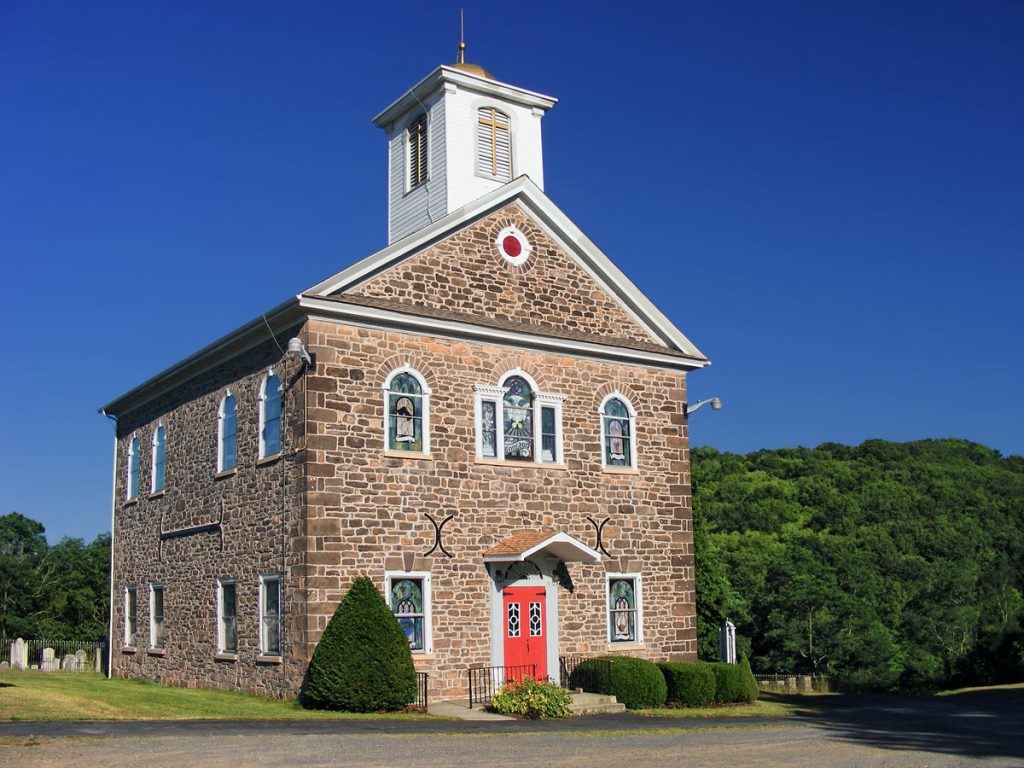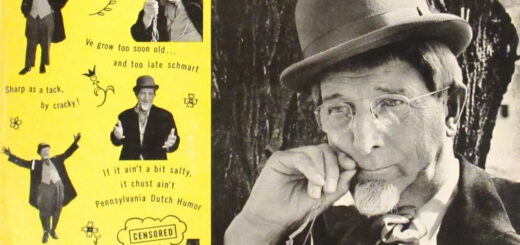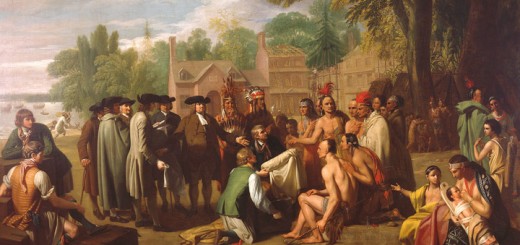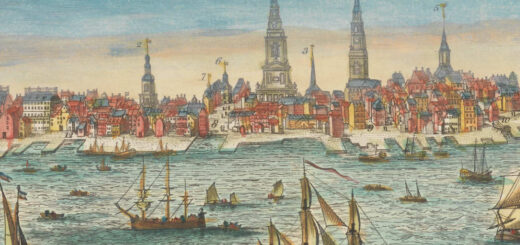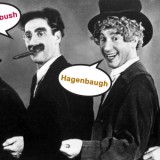1789 Essay on the Pennsylvania Deitsch, Part 2
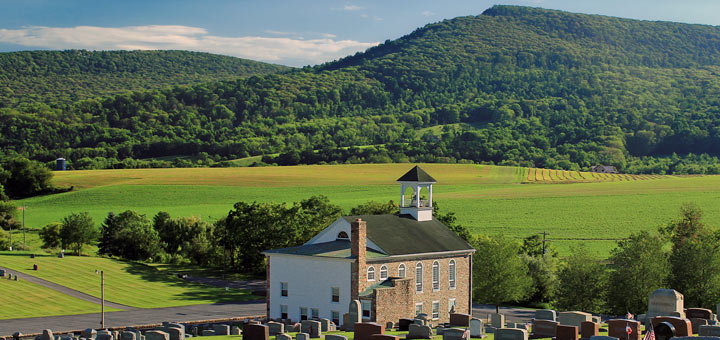
In the first part of the essay, An Account of the Manners of the German Inhabitants of Pennsylvania, Benjamin Rush listed some of the key characteristics of Pennsylvania’s Deitsch residents. These included thriftiness, respect for hard work, and a love of agriculture.
Below is the next part of Rush’s account. It begins by concluding the list of the Deitsch people’s traits and continues with an exploration of their religious practices.
An Account of the Manners of the German Inhabitants of Pennsylvania
14th. The Germans set a great value upon patrimonial property. This useful principle in human nature prevents much folly and vice in young people. It moreover leads to lasting and extensive advantages in the improvement of a farm. What inducement can be stronger in a parent to plant an orchard, to preserve forest-trees, or to build a commodious and durable house, than the idea that they will all be possessed by a succession of generations who shall inherit his blood and name?
15th. The German farmers are very much influenced in planting and pruning trees, also in sowing and reaping, by the age and appearances of the moon. This attention to the state of the moon has been ascribed to superstition; but if the facts related by Mr. Wilson in his observations upon climates are true, part of their success in agriculture must be ascribed to their being so much influenced by it.
16th. From the history that has been given of the German agriculture, it will hardly be necessary to add that a German farm may be distinguished from the farms of other citizens of the state by the superior size of their barns, the plain but compact form of their houses, the height of their enclosures, the extent of their orchards, the fertility of their fields, the luxuriance of their meadows, and a general appearance of plenty and neatness in every thing that belonged to them.
The German mechanic possesses some of the traits of the character that has been drawn of the German farmer. His first object is to become a freeholder; and hence we find few of them live in rented houses. The highest compliment that can be paid to them on entering their houses is to ask them, “Is this house your own?” They are industrious, frugal, punctual, and just. Since their settlement in Pennsylvania, many of them have acquired a knowledge of those mechanical arts, which are more immediately necessary and useful in a new country, while they continue at the same time to carry on the arts they imported from Germany with vigor and success.
But the genius of the Germans of Pennsylvania is not confined to agriculture and the mechanical arts. Many of them have acquired great wealth by foreign and domestic commerce. As merchants they are candid and punctual. The bank of North America has witnessed, from its first institution, their fidelity to all their pecuniary engagements.
Thus far have I described the individual character of several orders of the German citizens of Pennsylvania. I shall now take notice of some of their manners in a collective capacity.
All the different sects among them are particularly attentive to the religious education of their children and to the establishment and support of the Christian religion. For this purpose they settle as much as possible together, and make the erection of a school house and a place of worship the first objects of their care. They commit the education and instruction of their children in a peculiar manner to the ministers and officers of their churches. Hence they grow up with prejudices in favor of public worship and of the obligations of Christianity. Such has been the influence of a pious education among the German Lutherans in Pennsylvania, that in the course of nineteen years, only one of them has ever been brought to a place of public shame or punishment.
As members of civil government, the Germans are peaceable and exact in the payment of their taxes. Since they have participated in the power of the state, many of them have become sensible and enlightened in the science of legislation. Pennsylvania has had the speaker’s chair of her assembly and the Vice President’s office of her council filled with dignity by gentlemen of German families. The same gentlemen have since been advanced to seats in the House of Representatives under the new constitution of the United States. In the great controversy about the national government, a large majority of the Germans in Pennsylvania decided in favor of its adoption, notwithstanding the most popular arts were used to prejudice them against it.
The Germans are but little addicted to convivial pleasures. They seldom meet for the simple purpose of eating and drinking in what are justly called “feeding parties.” But they are not strangers to the virtue of hospitality. The hungry or benighted traveler is always sure to find a hearty welcome under their roofs. A gentleman of Irish extraction who lost his way in traveling through Lancaster county called late at night at the door of a German farmer. He was kindly received and entertained with the best of everything the house afforded. The next morning he offered to pay his host for his lodging and other accommodations. “No,” said the friendly German in broken English, “I will take nothing from you. I was once lost and entertained, as you have been, at the house of a stranger who would take no pay from me for his trouble. I am therefore now only discharging that debt. Do pay your debt to me in the same way to somebody else.”
They are extremely kind and friendly as neighbors. They often assist each other by loans of money for a short time, without interest, when the purchase of a plantation makes a larger sum necessary than is commonly possessed by a single farmer. To secure their confidence, it is necessary to be punctual. They never lend money a second time to a man who has once disappointed them in paying what he had borrowed agreeably by a promise or obligation. It was remarked, during the late war, that there were very few instances of any of them discharging a bond or a debt with depreciated paper money.
It has been said that the Germans are deficient in learning. That, in consequence of their want of more general and extensive education, they are much addicted to superstition and are frequently imposed upon in the management of their affairs. Many of them have lost valuable estates by being unacquainted with the common forms of law in the most simple transactions and many more of them have lost their lives by applying to quacks in sickness. But this objection to the Germans will soon cease to have any foundation in Pennsylvania. Several young men, born of German parents, have been educated in law, physics, and divinity. They have demonstrated by their abilities and knowledge that the German genius for literature has not depreciated in America. A college has lately been founded by the state in Lancaster and committed chiefly to the care of the Germans of all sects, for the purpose of diffusing learning among their children. This college is called after Dr. Franklin, who was President of the state at the time it was founded and who contributed very liberally to its funds. In this college they are to be taught the German and English languages and all those branches of literature which are usually taught in the colleges of Europe and America. The Principal of this college is a native of Pennsylvania of German parentage. His extensive knowledge and taste in the arts and sciences, joined with his industry in the discharge of the duties of his station, have afforded to the friends of learning in Pennsylvania the most flattering prospects of the future importance and usefulness of this institution.
Both sexes of the Germans discover a strong propensity to vocal and instrumental music. They excel in psalmody and all the other religious societies in the state.
The freedom and toleration of the government has produced a great variety of sects among the Germans in Pennsylvania. The Lutherans compose a great proportion of the German citizens of the state. Many of their churches are large and splendid. The German Presbyterians are the next to them in numbers. Their churches are likewise large, and furnished in many places with organs. The clergy, belonging to these churches have moderate salaries, but they are punctually and justly paid. In the country they have glebes, which are stocked and occasionally worked by their congregations. The extra expenses of their ministers, in all their excursions to their ecclesiastical meetings, are borne by their respective congregations. By this means the discipline and the general interests of their churches are preserved and promoted. The German Lutherans and Presbyterians live in great harmony with each other. They often preach in each others’ churches and, in some instances, unite in building a church in which they both worship at different times. This harmony between two sects, once so much opposed to each other, is owing to the relaxation of the Presbyterians in some of the peculiar doctrines of Calvinism. I have called them Presbyterians because most of them object to being designated by the name of Calvinists. The Mennonites, the Moravians, the Swingfielders, and the Catholics compose the other sects of the German inhabitants of Pennsylvania. The Mennonites hold war and oaths to be unlawful. They admit the sacraments of baptism, by sprinkling, and the supper. From them a sect has arisen, who hold with the above principles and ceremonies, the necessity of immersion in baptism; hence they are called Dunkers or Baptists. Previous to their partaking of the sacrament of the supper, they wash each others’ feet and sit down to a love feast. They practice these ceremonies of their religion with great humility and solemnity. They, moreover, hold the doctrine of universal salvation.
From this sect there have been several seceders, one of whom devoted themselves to perpetual celibacy. They have exhibited for many years a curious spectacle of pious mortification at a village called Ephrata in Lancaster County. They are at present reduced to fourteen or fifteen members. The Separatists, who likewise dissented from the Dunkers, reject the ordinances of baptism and the sacrament. They hold the doctrine of the Friends concerning the internal revelation of the gospel. They hold with the Dunkers the doctrine of universal salvation. The singular piety and exemplary morality of these sects have been urged by the advocates for the salvation of all mankind as a proof that the belief of that doctrine is not so unfriendly to morals and the order of society as has been supposed. The Dunkers and Separatists agree in taking no interest upon money and in not applying to law to recover their debts.
The final part of this essay will be posted in part three.

